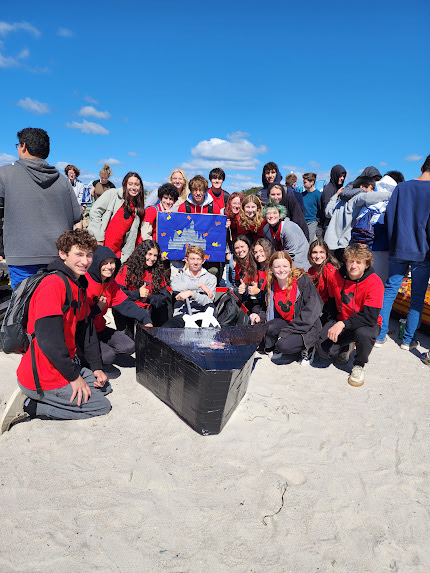At Morgan, students looking for a challenging yet engaging science experience can find it in the ECE physics class taught by Abigail Walston. The course offers an in-depth exploration of mechanics, and focuses on motion, velocity, acceleration, energy, power, fluids, momentum, and rotational motion. What makes this class different is the dynamic, hands-on approach to learning. Lena Flaherty, a student currently enrolled in the class said “My favorite topic we’ve covered is gravitation because we got to learn about different planets and space which I thought was cool.”
Unlike traditional lecture based courses, ECE physics is filled with interactive assignments and investigations. Students often engage in problem-solving activities such as scavenger hunts, color-by-numbers, and a capture the flag game. By doing this, Walston believes it makes the class more fun and effective to the students’ learning.

Field trips are also helpful for reinforcing concepts. One of the popular events done at Morgan is the annual Cardboard Boat Race at UConn Avery point. Students apply their knowledge of fluid mechanics by constructing and racing boats entirely made of cardboard. This application to the real world helps students see between theory and practice, reinforcing lessons of buoyancy and water resistance
An ECE course, such as physics, is a class aligned with the standards of UConn. Walston had received approval from UConn to teach this specific course at Morgan to ensure students would receive a college level education. As well as following the curriculum recommended by UConn, students also take the final exam at the end of the year. If students successfully complete the course, they will receive both high school and UConn credit, giving them a head start on their college education.
To prepare for ECE physics, students should build a strong foundation in science and math. They must have completed chemistry, where they will learn many crucial science concepts such as unit analysis and rearranging equations. Algebra 2 must also be completed to develop essential problem-solving skills. While Pre-calculus or calculus is not required beforehand, students should be currently enrolled to grasp a better understanding of advanced physics concepts.

Walston has been teaching ECE physics at Morgan for 3 years, after previously teaching AP physics. She made the switch because she believed that students deserved a fair grading system that reflected on their work throughout the entire year, rather than having everything come down to one exam. As she said, “I switched to ECE because they didn’t like that the college credit came down to one big test at the end of April.”
By offering ECE physics, Walston ensures students receive a fair and rewarding grade for their coursework in both high school and UConn. “Whatever grade they get in my class is the grade they get in the Uconn class,” said Walston. For students who enjoy problem-solving, hands-on experiments, and the opportunity to earn college credit, ECE physics is an exciting course to consider.



